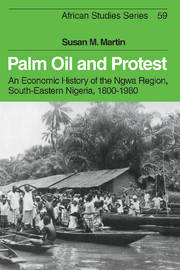Book contents
- Frontmatter
- Contents
- List of maps and figure
- Acknowledgements
- Abbreviations
- 1 Introduction
- 2 Ecology, society and economic change to 1891
- 3 The Ngwa and colonial rule, 1891–1914
- 4 The expansion of the oil palm industry, 1884–1914
- 5 The end of the boom
- 6 Cassava and Christianity
- 7 Authority, justice and property rights
- 8 Trade, credit and mobility
- 9 Production and protest: the Women Riot, 1929
- 10 Cash cropping and economic change, 1930–80
- 11 Conclusion
- Statistical appendix
- Notes
- Interviews conducted in the Ngwa region, 1980–1
- Bibliography
- Index
- Frontmatter
- Contents
- List of maps and figure
- Acknowledgements
- Abbreviations
- 1 Introduction
- 2 Ecology, society and economic change to 1891
- 3 The Ngwa and colonial rule, 1891–1914
- 4 The expansion of the oil palm industry, 1884–1914
- 5 The end of the boom
- 6 Cassava and Christianity
- 7 Authority, justice and property rights
- 8 Trade, credit and mobility
- 9 Production and protest: the Women Riot, 1929
- 10 Cash cropping and economic change, 1930–80
- 11 Conclusion
- Statistical appendix
- Notes
- Interviews conducted in the Ngwa region, 1980–1
- Bibliography
- Index
Summary
The dominant themes in rural West African economic history during the past two hundred years are usually held to be the impact of capitalism and colonialism. This study began as an attempt to follow convention, in exploring the colonial-period history of a region which was heavily involved in cash cropping. But during the research and writing, the region itself, and the Ngwa people, took hold of the author's loyalties and imagination. The result is a history of the Ngwa people which shows how the economic opportunities open to them were influenced by the local environment and by the social structures which they created, as well as by the economic and political changes wrought by outsiders. The interaction between local and external causes of change is explored in detail for the period between the First and Second World Wars, and shown to have continued up to the present day.
Over the past decade, scholars have increasingly turned to history for help in understanding recent African economic difficulties. They seek to uncover the roots of ‘underdevelopment’ and of the current ‘food crisis'. In eastern Nigeria, problems of ‘underdevelopment’ and of ‘food crisis’ have been relatively muted. In the 1970s the collapse of the oil palm export industry, which during the colonial period provided most of the region's import-purchasing power, caused no drop of incomes overall because it occurred simultaneously with the rise of profitable urban industries and of state employment, fuelled by the mineral oil boom. Meanwhile the region's farmers developed a profitable industry supplying gari (cassava meal) to the local towns.
- Type
- Chapter
- Information
- Palm Oil and ProtestAn Economic History of the Ngwa Region, South-Eastern Nigeria, 1800–1980, pp. 1 - 16Publisher: Cambridge University PressPrint publication year: 1988

